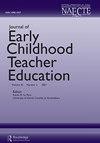The learner profile: piloting a tool to support contextualized understanding of the learner
IF 1.3
Q3 EDUCATION & EDUCATIONAL RESEARCH
Journal of Early Childhood Teacher Education
Pub Date : 2022-03-09
DOI:10.1080/10901027.2022.2047840
引用次数: 0
Abstract
ABSTRACT Deficit discourses in early childhood education position families of color, bilingual families, and families who are experiencing poverty as culturally and educationally deficient and are often reiterated through teacher education that relies on approximation of practice as modeled by a mentor teacher. Learning Teaching as an Interpretive Practice (LTIP) (Hollins, 2015) provides an assets-based framework for teaching that relies instead on a contextualized understanding of learners. Here, we examine our attempts as teacher educators to implement LTIP in our urban Midwestern early teacher education program. We focus on implementation of a tool for understanding individual children, the Learner Profile. Through case study, we analyze twenty learner profiles completed by five teacher candidates over the course of three semesters. Our findings suggest the Learner Profile guided teacher candidates toward more nuanced understandings of learners including multiple perspectives and unique aspects of lived experiences rather than over prescriptive developmental stages and categories. Still, we found understanding was highly mediated by the field placement context, teacher candidates’ own worldviews, and our facilitation as teacher educators. We conclude with implications for teacher educators who are interested in implementing the Learner Profile Tool and other tools for teacher education.学习者简介:试用一种工具来支持对学习者的情境化理解
摘要幼儿教育中的缺陷话语将有色人种家庭、双语家庭和正在经历贫困的家庭定位为文化和教育缺陷,并经常通过教师教育来重申,教师教育依赖于以导师为榜样的近似实践。作为口译实践的学习教学(LTIP)(Hollins,2015)为教学提供了一个基于资产的框架,而不是依赖于对学习者的情境化理解。在这里,我们考察了我们作为教师教育工作者在中西部城市早期教师教育计划中实施LTIP的尝试。我们专注于实施一个了解个别儿童的工具,即学习者档案。通过案例研究,我们分析了五名教师候选人在三个学期内完成的20份学习者档案。我们的研究结果表明,学习者档案引导教师候选人对学习者有更细致的理解,包括生活经历的多个视角和独特方面,而不是过于规范的发展阶段和类别。尽管如此,我们发现,理解在很大程度上受到了实地安置背景、教师候选人自己的世界观以及我们作为教师教育者的便利性的影响。最后,我们对有兴趣实施学习者档案工具和其他教师教育工具的教师教育工作者提出了建议。
本文章由计算机程序翻译,如有差异,请以英文原文为准。
求助全文
约1分钟内获得全文
求助全文
来源期刊

Journal of Early Childhood Teacher Education
EDUCATION & EDUCATIONAL RESEARCH-
CiteScore
2.20
自引率
16.70%
发文量
27
期刊介绍:
The Journal of Early Childhood Teacher Education, the official journal of the National Association of Early Childhood Teacher Educators, publishes original manuscripts, reviews, and information about association activities. Its purpose is to provide a forum for consideration of issues and for exchange of information and ideas about research and practice in early childhood teacher education. JECTE welcomes research reports, position papers, essays on current issues, reflective reports on innovative teacher education practices, letters to the editor and book reviews.
 求助内容:
求助内容: 应助结果提醒方式:
应助结果提醒方式:


